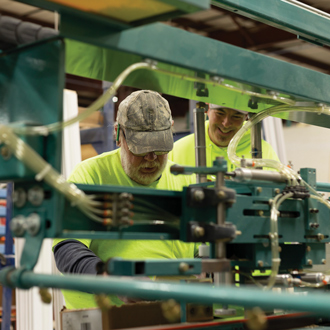To reach 120 years of service, Mans Lumber and Millwork president Doug Mans says you have to be able to adapt to changing circumstances, even if it means making difficult decisions in moments of crisis.
The family business began as a coal delivery outfit in Detroit, but as the Motor City grew, so did the business’s services. Soon, the company’s horses and buggies were hauling lumber alongside coal, helping build the city one structure at a time. Four generations later, the company now offers a full suite of custom molding, flooring and prefab installation services to property owners and builders across Michigan.
But growth has not been an easy ride. As the economic turmoil of 2008 rocked home improvement and construction, Mans and his family had to take drastic action to keep the company afloat, even though it meant making sacrifices that cut to the very root of the operation. As companies of all sizes and from all industries now face their own challenges from COVID-19, Mans describes when he knew he had to move to protect his company, how he made painful choices to stabilize the business and the surprising revelations about team unity he discovered.

As the Bubble Bursts
In the mid-2000s, Mans says the business was riding high and operating at its peak. Construction across Michigan was robust, and Mans Lumber and Millwork included six locations and employed 210 people. In 2006, the company hit a financial milestone of $83 million in annual sales.
As Mans Lumber and Millwork was operating at its apex, a toxic mix of subprime mortgages, unqualified lending and failures in financial regulation converged to cause one of the most disastrous financial crises in U.S. history.
Nationally, nearly 9 million jobs were lost as a result of the crisis. In Michigan, the unemployment rate rose to 9.3 percent, nearly triple what it had been in 2000. The effects on Mans’ business were swift and sharp.
“In 2006, life was great,” Mans says. “I had just taken over the presidency of the company after my uncle retired, but things changed quickly.”
The subprime mortgage crisis would eventually impact nearly every industry, but its effects on construction were staggering. From 2004 to 2009, housing starts in Michigan plummeted more than 83 percent.
Sales quickly fell at Mans’ company, eventually hitting a trench in 2009 at $20 million, a 76 percent drop in just three years.
“By the end of 2006, we knew we were in trouble,” he says. “Every month our revenue fell, and even though we had a responsible budget, we just couldn’t keep up.”
The Human Cost
Mans says he had weathered economic slowdowns before, but nothing like the Great Recession. As conditions worsened, Mans’ team decided reducing the workforce would be a painful, but necessary, way to stem the tide.
“We started by cutting about 10 percent of our workforce—roughly 20 or 25 people,” he says. “It was never easy, but at that point, you know you have some fluff, you aren’t necessarily getting rid of your all-stars in that first cut.”
As he made the unfortunate step to let employees go, Mans says seniority was not a huge factor in the decision. Instead, Mans and his team focused on an employee’s overall utility to the company: Could they adapt to different roles and bring in revenue during a critical time?
“We all had to take on new roles. We all became custodians, cleaning the bathrooms and sweeping the floors,” Mans says. “Everyone learned that being multifaceted and accomplishing different roles was a huge value to the company.”
“One of the silver linings we found was that we were operating with really seasoned veteran employees, and that alone was a benefit in helping retain customers.” —Doug Mans, Mans Lumber and Millwork president
Recognizing your operation’s baseline can help you weather any storm. The annual Cost of Doing Business Study offers retailers direct insight into the performance of hardware stores, home centers and lumberyards. It also delivers helpful metrics to evaluate specific facets of your business, including three listed here. To learn more and participate in this year’s study, visit nrha.org/codb.
Even with personnel cuts, the business couldn’t stop the losses from the economic downturn. The Mans family gathered together to candidly rank every business asset: equipment, inventory and locations. They thought strategically about what was essential for operations, offloading superfluous inventory and selling trucks and lumber equipment.
Mans says the family ranked each of the company’s six locations, deciding which stores could be closed or consolidated in a worst-case scenario. The team learned that by closing one location, they could free up approximately $1 million to use in other areas. They drew a service radius around each location, identifying overlaps and deciding which locations could be closed without sacrificing customers.
Eventually, the business emerged with 60 employees and two locations. It was a long way from its peak just a few years before, but the Mans family knew the business was operating with a lean, agile team.
“One of the silver linings we found was that we were operating with really seasoned veteran employees, and that alone was a benefit in helping retain customers,” he says.
For the team that remained, acting quickly and urgently was vital. Mans printed business cards for every employee and encouraged them to introduce themselves, hoping to create new business with personal contacts.
“The funny thing is, during all this time, our competitors were saying we were going out of business. We were letting people go, selling inventory and closing locations, so from the outside, it looked like that was the case,” he says. “In reality, we were saving the business.”
 ‘Fighting Together’
‘Fighting Together’
As the company operated with a nimble crew, a phone call from an old friend helped motivate Mans. The caller, a former captain of the University of Michigan football team, encouraged Mans to think of what he had currently, not what he had lost.
“From that day forward, I knew I was lucky,” Mans says. “I realized we had a better opportunity than 99 percent of the world. We still had a $20 million company and we couldn’t feel sorry for ourselves in that position. We had to change our attitudes from feeling pity to being proud of what we did have.”
The business continued operating under its leaner model, but a golden opportunity was just around the corner. National Lumber of Warren, Michigan, had experienced its own hardships during the Great Recession, dropping from $115 million in sales to $10 million at its lowest point. Mans and the company’s president talked often about how they could find a way through the downturn.
“I called the company’s owner and said because we’re both struggling for revenue, why don’t we help one another?” Mans says.
The companies had complementary but distinct service models: Mans specialized in outfitting smaller construction companies and home remodelers. National Lumber leaned heavily toward multifamily and new construction.
The companies forged a strategic partnership: In late 2009, National Lumber executives and salespeople joined the Mans team, and as construction slowly returned to Michigan, so did sales.
“With our partnership, we added 50 percent of revenue to our bottom line in one year,” Mans says. “That partnership allowed us to go from losing money to making money very quickly.”
Now, a decade removed from the darkest days of the recession, Mans is operating with about 150 employees across four locations. Revenue has returned, and the motivation employees felt to steady the ship hasn’t wavered.
“For a while there, it was all hands on deck,” Mans says. “It was absolutely one of the worst times I’ve had with the company, but also one of the best. Every team member understood the urgency of the situation. We were fighting together.”
 Hardware Retailing The Industry's Source for Insights and Information
Hardware Retailing The Industry's Source for Insights and Information








